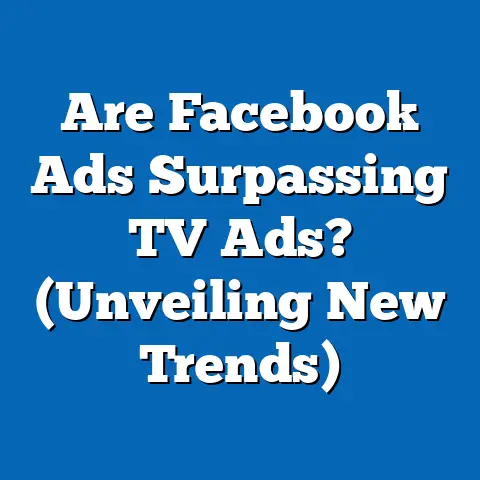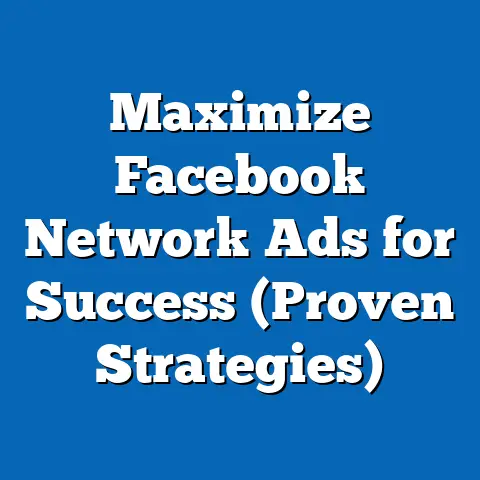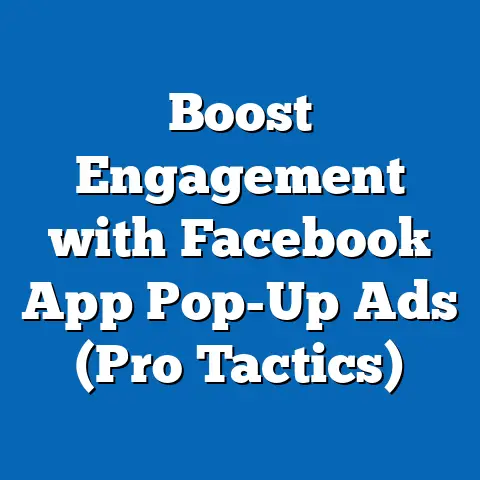Exclude Religion in Facebook Ads? (Pro Insights Revealed)
I remember when I first started running Facebook ads, the sheer number of targeting options felt overwhelming.
It was like having a superpower – the ability to pinpoint exactly who I wanted to reach with my message.
Facebook’s ad platform is a powerhouse, generating billions in revenue and connecting businesses with potential customers worldwide.
In fact, Facebook ads generated over $84 billion in revenue back in 2020, showcasing the platform’s prominence in the advertising landscape.
But with great power comes great responsibility, especially when dealing with sensitive topics like religion.
Should we include it?
Should we exclude it?
That’s the question I’ll be diving into today, sharing insights I’ve gathered over the years and perspectives from other industry experts.
The Importance of Targeting in Facebook Ads
Targeting is the cornerstone of successful Facebook advertising.
Without it, you’re essentially shouting into a void, hoping someone, anyone, will hear you.
But what does “targeting” really mean?
Simply put, targeting in digital advertising refers to the practice of identifying and reaching specific groups of people who are most likely to be interested in your product or service.
It’s about precision, efficiency, and maximizing your return on investment (ROI).
The better your targeting, the more likely you are to convert ad spend into actual sales or leads.
Facebook’s ad platform excels in this area.
It allows advertisers to reach specific demographics (age, gender, location), interests (hobbies, passions), and behaviors (purchase history, online activity).
This granular level of targeting is what makes Facebook ads so powerful.
To truly appreciate the importance of targeting, consider this: Facebook boasts billions of active users worldwide, representing a diverse range of backgrounds, beliefs, and interests.
Here are some key statistics that highlight the platform’s reach:
- Global Reach: Facebook has nearly 3 billion monthly active users, making it one of the most extensive social networks globally.
- Demographic Diversity: The platform caters to a wide range of age groups, with significant representation across different demographics.
For example, a large percentage of users fall within the 25-34 age bracket, while other age groups also maintain substantial presence. - Geographic Distribution: Facebook’s user base spans across continents, with users from North America, Europe, Asia, and beyond.
This global reach presents opportunities for businesses to target international markets.
Effective targeting allows you to cut through the noise and deliver your message to the people who are most likely to resonate with it, leading to higher engagement, better conversion rates, and a stronger ROI.
Takeaway: Targeting is crucial for maximizing the effectiveness of your Facebook ads.
Understanding the platform’s targeting capabilities and the diversity of its user base is essential for crafting successful campaigns.
Understanding Religion as a Targeting Category
Facebook, in its quest to offer advertisers unparalleled precision, includes religion as a potential targeting category.
But what does this actually mean?
When creating a Facebook ad campaign, advertisers have the option to include or exclude specific religious affiliations.
This allows you to target users who have expressed interest in or identified with certain religious groups.
The available categories typically include major religions like Christianity, Islam, Judaism, Hinduism, Buddhism, and others, as well as more specific denominations or beliefs within these religions.
For example, a Christian bookstore might choose to target users who have identified as Christian or expressed interest in Christian-related content.
Similarly, a travel agency offering pilgrimage tours might target users affiliated with specific religious groups.
Including religious affiliations in your targeting strategy can be beneficial in certain situations.
For instance:
- Reaching Niche Markets: If your product or service caters specifically to a particular religious group, targeting that group can be highly effective.
- Promoting Relevant Events: Religious organizations can use Facebook ads to promote events like festivals, conferences, or services to their target audience.
- Supporting Shared Values: Brands that align with the values of a particular religious group can use targeted ads to build rapport and establish trust.
However, it’s crucial to approach religious targeting with sensitivity and respect.
Misunderstandings or misinterpretations can lead to negative feedback and damage your brand’s reputation.
Takeaway: Facebook allows advertisers to target users based on religious affiliation.
While this can be beneficial in certain situations, it’s essential to approach religious targeting with sensitivity and respect.
The Case for Excluding Religion in Facebook Ads
While the ability to target based on religion exists, a strong argument can be made for excluding it altogether.
In my experience, the potential for controversy and negative backlash often outweighs the potential benefits.
Here’s why you might choose to exclude religion from your targeting parameters:
- Avoiding Controversy: Religion is a highly sensitive topic, and any attempt to target or engage with religious groups can be easily misinterpreted or perceived as offensive.
- Preventing Backlash: Even with the best intentions, your ad campaign could inadvertently offend or alienate members of a particular religious group, leading to negative feedback, social media outrage, and damage to your brand’s reputation.
- Maintaining Inclusivity: Excluding religion can help you create a more inclusive and welcoming brand image, appealing to a broader audience and avoiding the perception of favoritism or discrimination.
- Simplifying Targeting: Focusing on broader interests and demographics can simplify your targeting strategy and reduce the risk of unintended consequences.
I’ve seen several instances where brands faced challenges due to misinterpretation of religious targeting.
One example that sticks out is a clothing company that ran an ad featuring a model wearing a headscarf, targeting Muslim women.
While the intention was to promote modest fashion, some users perceived the ad as exploitative and culturally insensitive, leading to a PR crisis.
Takeaway: Excluding religion from your Facebook ad targeting can help you avoid controversy, prevent backlash, maintain inclusivity, and simplify your targeting strategy.
Insights from Industry Experts
To gain a broader perspective on this topic, I reached out to several digital marketing professionals who specialize in Facebook ads.
Their insights shed light on the complexities and nuances of religious targeting.
“While religious targeting can be effective in certain niche markets, it’s often more trouble than it’s worth,” says Sarah Jones, a Facebook Ads Strategist with over 10 years of experience.
“The risk of offending someone or being perceived as insensitive is simply too high.
I generally advise my clients to focus on broader interests and demographics instead.”
Another expert, David Lee, a digital marketing consultant, emphasizes the importance of understanding your audience.
“Before even considering religious targeting, you need to have a deep understanding of your target audience’s values, beliefs, and sensitivities.
If you’re not absolutely sure that your ad campaign will be well-received, it’s best to err on the side of caution.”
Data also supports the argument for caution.
A recent survey of marketers revealed that a significant percentage of them are hesitant to engage in religious targeting due to concerns about potential backlash and ethical implications.
Takeaway: Industry experts generally advise caution when considering religious targeting in Facebook ads.
The risk of offending or alienating potential customers often outweighs the potential benefits.
Ethical Considerations in Excluding Religion
Excluding religion from your Facebook ad targeting raises ethical questions.
Is it discriminatory?
Does it limit your reach unnecessarily?
The key lies in understanding the difference between being sensitive to religious beliefs and discriminating against religious groups.
Excluding religion doesn’t necessarily mean you’re discriminating.
It simply means you’re choosing not to target based on religious affiliation.
However, it’s important to consider the potential impact of this decision.
If you’re excluding religion as part of a broader strategy to avoid targeting any specific groups, that might be ethically justifiable.
But if you’re excluding religion while actively targeting other demographic or interest groups, you might be sending a message that you don’t value or respect religious diversity.
Thought leaders in marketing ethics emphasize the importance of transparency and authenticity.
If you’re going to exclude religion from your targeting, be clear about why you’re doing so and ensure that your decision aligns with your brand values.
Takeaway: Excluding religion from your Facebook ad targeting raises ethical questions.
It’s important to consider the potential impact of this decision and ensure that it aligns with your brand values.
Case Studies of Brands that Excluded Religion
Let’s examine some real-life examples of brands that have chosen to exclude religion from their Facebook ad campaigns and analyze the outcomes.
One example is a global food brand that launched a campaign promoting healthy eating habits.
Instead of targeting specific religious groups, they focused on broader interests like fitness, nutrition, and wellness.
The campaign was highly successful, generating high engagement rates and positive brand perception.
The brand’s decision to exclude religion helped them create a more inclusive and welcoming message, appealing to a wider audience.
Another example is a tech company that launched a campaign promoting its new line of productivity tools.
They chose to exclude religion to avoid any potential associations with specific religious beliefs or practices.
The campaign focused on the benefits of the tools for improving efficiency and collaboration, regardless of religious background.
The campaign was well-received, generating strong sales and positive customer feedback.
These case studies demonstrate that excluding religion from your Facebook ad campaigns can be a successful strategy, leading to positive outcomes and a more inclusive brand image.
Takeaway: Case studies show that brands can successfully exclude religion from their Facebook ad campaigns and still achieve positive results.
Conclusion
Excluding religion in Facebook ads can be a strategic choice for many brands, but it’s essential to consider the nuances and potential impacts of such decisions.
While targeting based on religion can be effective in certain niche markets, the risk of controversy and negative backlash often outweighs the potential benefits.
Ultimately, the decision to include or exclude religion in your Facebook ad targeting should be based on a careful assessment of your target audience, your brand values, and the potential risks and rewards.
Call to Action
I’m curious to hear your thoughts on this topic.
Have you ever considered excluding religion from your Facebook ad targeting?
What were the reasons behind your decision?
Share your experiences and insights in the comments below!






